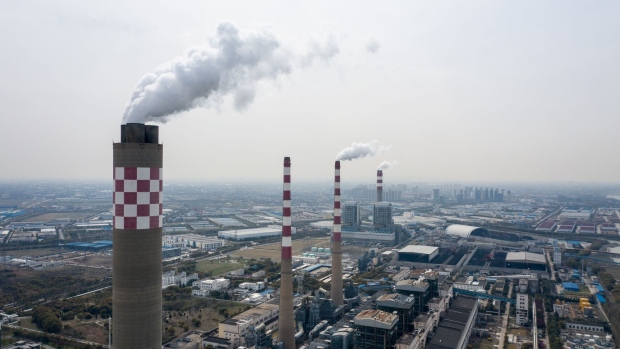Sep 21, 2021
Beijing Pressures Top China Manufacturing Hub to Curb Power Use
, Bloomberg News

(Bloomberg) -- Jiangsu -- a Chinese province with an economy as large as Canada’s -- is curbing electricity supplies to industry as Beijing pressures it to reduce energy usage to cut emissions.
Many factories in the key manufacturing hub north of Shanghai have cut or even halted their operations, according to more than a dozen company executives interviewed by Bloomberg, as well as local media and researchers. The curbs, which are on an unprecedented scale, started in the second week of September and will last at least through the end of the month, they said.
The measures -- aimed at reducing greenhouse gas emissions in the long run -- came after the provincial government was urged by Beijing to make more efforts to meet its environmental targets for this year, said the executives who asked not to be identified as the matter is private.
The central government made each province create an energy intensity target as part of President Xi Jinping’s plan to reach carbon neutrality by 2060. Jiangsu missed its goal, so is being ordered to reduce power use as much as possible. It was among several provinces that failed to lower energy intensity and the total amount of power consumed in the first half of the year, the National Development and Reform Commission, the country’s top economic planner, said in a statement last month.
The curbs, which also include reducing power use in commercial venues and public utilities in some cities, come as Chinese local governments try and balance Beijing’s environmental targets and social campaigns while maintaining economic growth. Xi is looking to cut carbon emissions, ensure blue skies ahead of the Winter Olympics, and has also advocated “Common Prosperity” as a long-term agenda to reduce inequality.
No one picked up calls to the offices of spokespeople for Jiangsu government agencies seeking comment. Monday and Tuesday are public holidays in China. The department that oversees manufacturing in the province called on all local companies and individuals to save energy as part of the environmental push, it said in a statement dated Sept. 16.
Jiangsu’s gross domestic product was 10.3 trillion yuan ($1.59 trillion) last year. That’s just below Canada’s $1.64 trillion. Manufacturing accounted for more than 40% of the economy of the province, a hub for electronics, automakers and clothing.
The coastal province is also home to major petrochemical producers Hengli Petrochemical Co. and Jiangsu Eastern Shenghong Co., as well as Shagang Group, China’s biggest privately-owned steelmaker. It accounts for more than 10% of China’s steel production.
More than 10 steel mills in Jiangsu have completely shut down, according to some of the company executives and reports from industry researchers. Some of the producers expect the curbs on electricity use could continue through October or even November, the executives said. Most mills in the neighboring province of Zhejiang have also been ordered to cut output, industry consultancy Mysteel said in a note.
Some smaller businesses in Jiangsu, including home-appliance makers and apparel companies, have also been forced to close, according to the executives and domestic media reports. Streetlights and neon lights in some cities have been turned off at night to save electricity, according to local government notices seen by Bloomberg News. Large supermarkets and shopping malls have also been ordered to reduce business hours and minimize the use of the air conditioners and elevators.
©2021 Bloomberg L.P.





